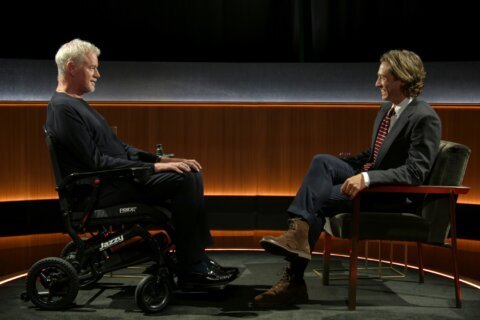In 2017, Chloé Zhao showed indie promise with her modern Western “The Rider.”
Now, she’s the darling of international cinema with “Nomadland,” winner of the Golden Lion at the Venice Film Festival and the People’s Choice Award at the Toronto Film Festival — the only film ever to win both. Locally, it anchored opening night of the Middleburg Film Fest in Virginia before finally hitting select theaters this past week.
Based on Jessica Bruder’s nonfiction book “Nomadland: Surviving America in the Twenty-First Century” (2017), the film follows Fern, a widow who lost her husband, her job and her identity in 2008 when the Great Recession closed her factory in Nevada. So, she embarks on a journey through the American West as a van-dwelling nomad.
Frances McDormand could very well win her third Best Actress Oscar, making her one shy of Katharine Hepburn’s immortal record of four. She of course won her first Oscar as the pregnant cop in “Fargo” (1996), then won her second Oscar as a mother seeking her daughter’s killer in “Three Billboards Outside Ebbing, Missouri” (2017).
Both of those roles were far showier in terms of comedic accents and sarcastic zingers. “Nomadland” is a more internalized performance, showing emotions in her eyes, expressions and posture. Critics are calling it her greatest work, though 50 years from now, we’ll still remember her for “Fargo,” her career role. There is a distinction.
With the exception of her love interest, played by the prolific David Strathairn (“Good Night and Good Luck”), the supporting cast consists of actual nomads à la Italian Neorealism. Their words teach us all about van culture, from the leader’s monologue on the “tyranny of the dollar” to her friend’s desire to make one last kayaking trip.
Few filmmakers capture the American West like Zhao. Last time, it was Brady Jandreau’s horse silhouetted against Western landscapes. This time, it’s poetic pans across gravel parking lots to gaze at orange and purple sunsets, frame-worthy paintings of Fern, small in the foreground with majestic mountains in the distance.
Zhao’s flair for the open road recalls Dennis Hopper’s “Easy Rider” (1969), while her magic-hour skies rival Terrence Malick’s “Days of Heaven” (1978), offering Fern as a successor to Jack Nicholson in “Five Easy Pieces” (1970) and Harry Dean Stanton in “Paris, Texas” (1984), a masterpiece so profound that it’s hard to put into words.
McDormand met Zhao at the Independent Spirit Awards, where “The Rider” lost Best Feature and Best Director to Jordan Peele’s “Get Out” (2017). This year, she could become just the second female Best Director after Kathryn Bigelow’s “The Hurt Locker” (2009), and the second Asian director in a row after Bong Joon-ho’s “Parasite” (2019).
Born in Beijing, Zhao knows the price of globalization, as “Nomadland” explores the isolation of so many Americans displaced by technology. Few scenes capture the zeitgeist like Fern working an assembly line at Amazon and stocking shelves at Walmart, and napping on exercise equipment because she has nowhere else to go.
It all builds to a trifecta of silent scenes, as Zhao knows there’s power in these quiet moments, allowing the audience to fill in their meaning just by scanning the image.
First, Fern stares at an empty Thanksgiving table at her guesthouse, remembering how warm and welcoming it was the night before, but knowing she doesn’t belong.
Next, she returns to her old abandoned factory, only to find her late husband’s office still intact, his desk photos covered in thick dust, everything eerily just as it was.
Finally, she returns to her foreclosed rancher to survey a life she once had. Viewers may crave a tidier resolution with everything explained, but as Fern walks out the backdoor to stare at the mountains, the message is clear: She’s letting go of her past.
Time to hit the road, born anew in her new nomad lifestyle, driving toward the horizon.









